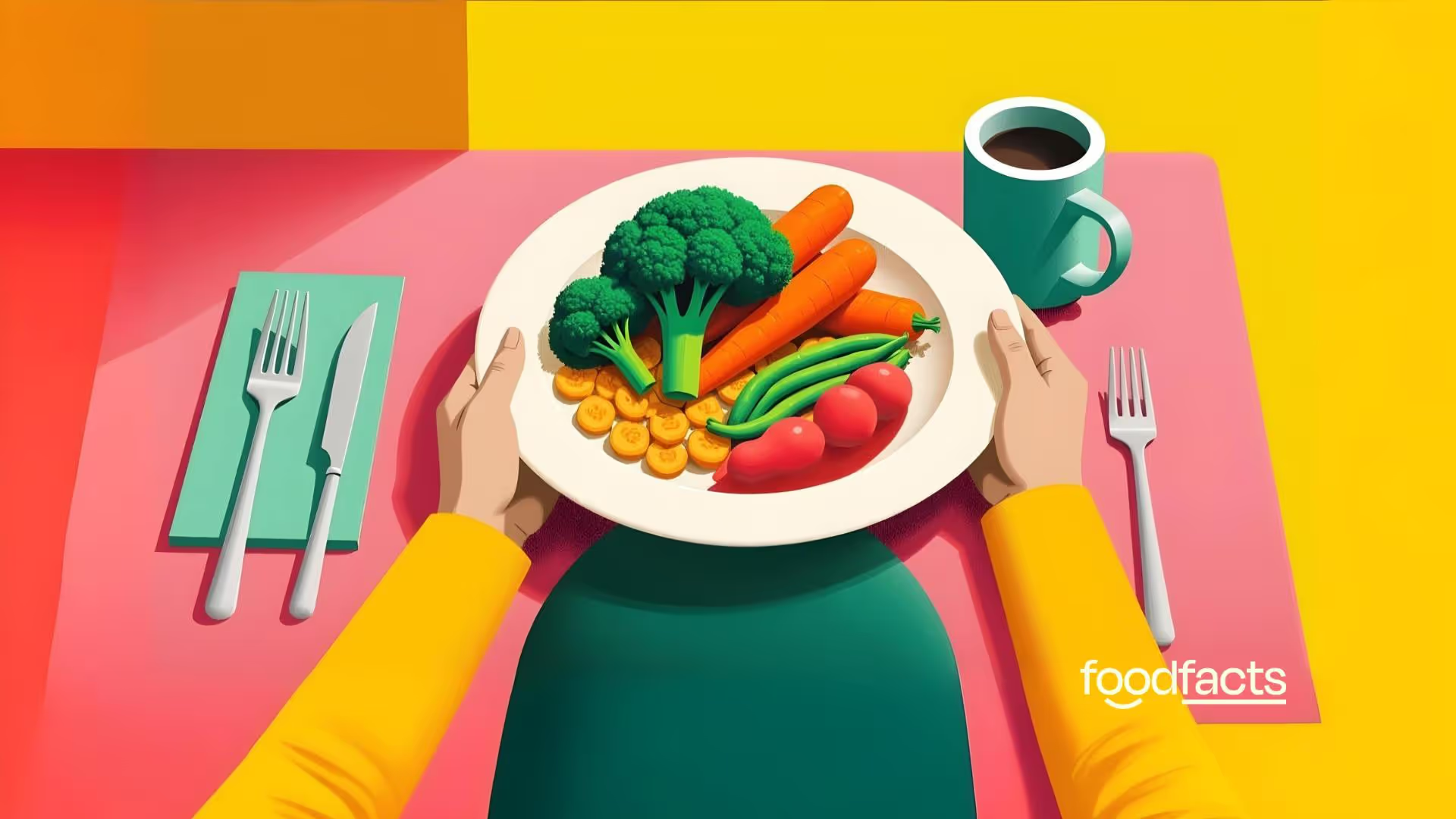
No, fibre isn’t useless – why Dr Ede's comments on DOAC are wrong





Coral Red: Mostly False
Orange: Misleading
Yellow: Mostly True
Green: True
Learn more about our fact-checking policies
A recent episode of the Diary of a CEO podcast featured Georgia Ede, a psychiatrist specialising in nutritional and metabolic psychiatry. During the episode, Ede makes several claims about dietary fibre, suggesting that it’s unnecessary for digestion, does not "clean" the colon, and is not required for other functions that it’s typically associated with. These statements contradict decades of nutrition science and public health advice. So, is fibre essential, or is it an overrated dietary component? We fact-check these claims to provide a much-needed reality check.
Fibre is indigestible by humans, but it plays an essential role in maintaining gut health, promoting regular bowel movements, and supporting beneficial bacteria that produce vital compounds like butyrate. It also helps control blood sugar levels, particularly for individuals consuming carbohydrates. The idea that fibre is unnecessary or harmful contradicts extensive research showing its numerous health benefits.
Misinformation about fibre can lead people to unnecessarily cut it from their diets, which may negatively impact digestion, gut microbiota, and overall health.

When assessing health claims, always look for peer-reviewed research and guidance from reputable organisations. Claims that contradict long-standing nutritional evidence should be scrutinised carefully.
Fibre helps blood sugar, and no, you don’t need to cut carbs.
Ede begins by discussing the role of fibre in blood sugar regulation. She said:
“So if you're eating a high carbohydrate diet, fibre can soften your glucose spikes and that's a plus. But there's a more effective way to lower your glucose spikes, it is to not get a glucose spike in the first place and that may not require taking all the carbohydrate out of your diet, it might just mean lowering it to your personal tolerance.”
It’s true that certain types of dietary fibre influence your blood sugar levels after a meal. When ingested, viscous soluble fibre forms a gel-like substance in your stomach that slows digestion, leading to a more gradual absorption of carbohydrates and preventing rapid blood sugar spikes.
And while Georgia’s statement that “a more effective way to lower your glucose spikes is not to get a glucose spike” is technically accurate, it lacks important context and is ultimately misleading.
Many nutrient-rich foods in a balanced diet naturally cause some level of glucose to increase, which is a normal and healthy response to food. The goal shouldn’t be to eliminate all glucose spikes but to manage them effectively. Rather than cutting out foods that cause any rise in blood sugar, the focus should be on reducing frequent and extreme spikes from high-sugar, low-fibre foods.
.avif)
Fibre Supports Digestive Health – Even If It’s Not a “Broom” for Your Colon.
Ede goes on to claim, “Another thing people often say about fibre is that it sweeps your colon clean of toxins that might otherwise build up and cause problems. But there's no evidence that fibre is sweeping anything clean or there's never been a study that demonstrates this.”
This claim oversimplifies and distorts the role of fibre, using a straw man fallacy to dismiss its well-documented benefits. While fibre doesn’t literally “sweep” the colon like a broom, it plays a crucial role in digestive health by adding bulk to stool and promoting regular bowel movements. This helps move waste efficiently through the intestines, reducing the risk of constipation, bloating, and digestive disorders like diverticulitis.
In fact, the scientific evidence is so overwhelming that a recent review published in Nutrients states:
“Of all the beneficial effects of dietary fibre, perhaps the most widely known and appreciated is the effect on gut motility and prevention of constipation. Many studies support such an effect, which appears incontrovertible based on the available evidence.”
Although the body has its own detoxification systems—including the liver and kidneys, which remove toxins—fibre still plays a key role in digestion and elimination. Despite some mixed research, it’s highly likely that a high-fibre diet reduces the risk of colorectal cancer. Research suggests that fibre reduces cancer risk through mechanisms such as:
- Increasing stool bulk and diluting carcinogens in the colon;
- Reducing transit time, meaning harmful substances spend less time in the digestive tract;
- Fermenting into short-chain fatty acids, which support gut health and may have protective effects.
While fibre doesn’t physically “sweep” toxins away, it undeniably supports digestive health and waste elimination.
Fibre couldn’t be more important for your digestion.
Ede continues with: “the biggest myth about fibre is that it's good for digestion because fibre by definition is indigestible by humans.”It's true that dietary fibre is indigestible by human enzymes; however, this indigestibility is precisely what makes fibre beneficial for digestion. Dr Alan Desmond, Consultant Gastroenterologist and gut health specialist said:
In this interview, Georgia Ede dismisses fibre’s role in gut health and motility - an assertion so wildly off the mark that it barely warrants a response.
The overwhelming body of scientific evidence contradicts her claim: fibre plays a crucial role in maintaining gut function, promoting bowel regularity, and reducing the risk of conditions like diverticular disease and colorectal cancer.
She then states that because fibre is “indigestible,” it’s therefore of no use to humans. This reveals a fundamental misunderstanding of how dietary fibre interacts with the gut microbiome. While human enzymes cannot break down fibre, our gut microbes certainly can. These “microbiome-accessible carbohydrates” (MACs) serve as fuel for a healthy gut.
Fibre is essential for butyrate and a ketogenic diet isn’t a substitute.
The fourth claim Ede makes is that we don’t need fibre to provide butryate.
“There are quite a few papers on this claiming that we need fibre because we need to feed our cells butyrate, which is a breakdown product of fibre. But if you think about what a ketone is, it’s beta-hydroxybutyrate, which feeds the intestinal cells just as well, so you don't need to eat fibre to feed your cells butyrate. If you think that the cells need butyrate then you can get it from a ketogenic diet.”
Butyrate is a short-chain fatty acid (SCFA) produced when gut bacteria ferment dietary fibre. It serves as a primary energy source for the cells lining the gut, playing a crucial role in gut barrier integrity, inflammation regulation, and overall digestive health. While beta-hydroxybutyrate (BHB)—a ketone body produced during ketosis—shares some structural similarities with butyrate, they are not interchangeable in function.
BHB can serve as an alternative energy source during low carbohydrate intake, but research suggests it does not replicate butyrate’s role in maintaining colon health. Butyrate has specific anti-inflammatory and gut-protective effects that BHB does not fully replace. Fibre is essential for supporting the gut microbiota, which in turn produces butyrate and other SCFAs essential for digestive health.
Georgia acknowledges one of the key reasons fibre is so valuable: its role in the production of butyrate. But then immediately pivots to the false claim that a high-fat ketogenic diet provides the same benefit. Suggesting that a high-fat, fibre-deprived diet could adequately support gut health is not just misleading, it’s a misrepresentation of the science.
Ultimately, this is a mix of outdated concepts, scientific cherry-picking, and false equivalencies that may sound provocative but don’t hold up to basic scrutiny. Fibre isn’t just beneficial - it’s essential.
In the podcast, Ede creates a false and potentially harmful narrative that humans don’t need fibre in their diet. Fibre is essential for healthy bowel movements, reducing colorectal cancer risk, and supporting overall health.
We have contacted Dr Ede and are awaiting a response.
Disclaimer
Quotes from the podcast have been phrased to remove filler words, making it easier to read, without changing the content.
The information provided here is for general information purposes only, and should not be considered medical advice. If you have Type 1 or Type 2 diabetes or any condition requiring careful blood sugar monitoring, please consult your healthcare provider for personalised guidance tailored to your specific needs.
Fiber isn't just about regularity - it's the preferred fuel for our gut microbiome, which influences everything from immune function to mental health. To dismiss fiber is to ignore decades of research showing its role in reducing chronic disease risk and supporting overall vitality.
Stand Against Nutrition Misinformation
Misinformation is a growing threat to our health and planet. At foodfacts.org, we're dedicated to exposing the truth behind misleading food narratives. But we can't do it without your support.
📚 Sources
McRorie, J W et al. (2017). Understanding the Physics of Functional Fibers in the Gastrointestinal Tract: An Evidence-Based Approach to Resolving Enduring Misconceptions about Insoluble and Soluble Fiber. DOI: 10.1016/j.jand.2016.09.021.
Jenkins, D J. (1978). Dietary fibres, fibre analogues, and glucose tolerance: importance of viscosity. doi: 10.1136/bmj.1.6124.1392.
Kunzmann, A T. (2015). Dietary fiber intake and risk of colorectal cancer and incident and recurrent adenoma in the Prostate, Lung, Colorectal, and Ovarian Cancer Screening Trial. doi: 10.3945/ajcn.115.113282.
Breuling, M. (2024). Butyrate- and Beta-Hydroxybutyrate-Mediated Effects of Interventions with Pro- and Prebiotics, Fasting, and Caloric Restrictions on Depression: A Systematic Review and Meta-Analysis. https://doi.org/10.3390/life14070787.
Chriett, S. (2019). Prominent action of butyrate over β-hydroxybutyrate as histone deacetylase inhibitor, transcriptional modulator and anti-inflammatory molecule. https://doi.org/10.1038/s41598-018-36941-9.



foodfacts.org is an independent non-profit fact-checking platform dedicated to exposing misinformation in the food industry. We provide transparent, science-based insights on nutrition, health, and environmental impacts, empowering consumers to make informed choices for a healthier society and planet.

Was this article helpful?

















.svg)
